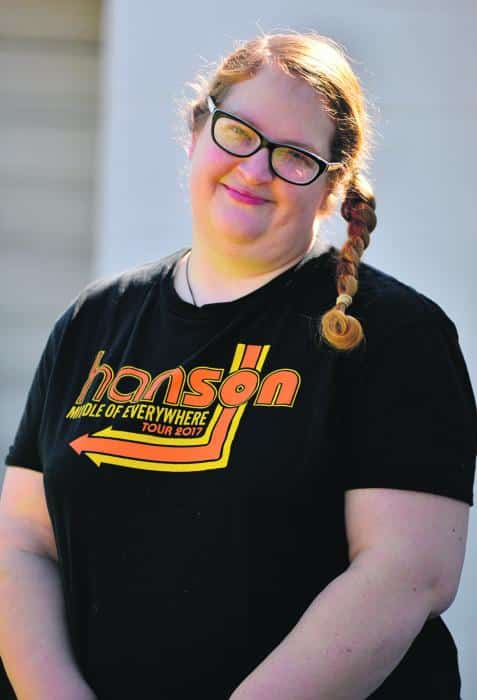20 October 2017 – Claire van Oirschot of Whakatane is 32 and identifies as having Asperger’s Syndrome. She publishes a semi-regular blog called clairesblog424 in which she talks about, among other things, being a Hanson fan, her family’s move from Holland when she was 3, complex emotions, having a bike accident and getting a cat. Here she explains what being an Aspie is like.

Claire van Oirschot. Picture courtesy: Whakatane Beacon
A LOT OF the time I feel so isolated and alone. As though no one understands me at all.
I would not be too surprised if no one understood me. I mean….I barely understand myself half the time. Like…my mind is just this mystery – like a maze or something. Keeps getting more confusing and mysterious the further I go along. The more I try understanding myself the more confusing things feel.
Life is hard. I know that it is hard for everyone because everyone has his or her ‘trials and tribulations’. I feel that for people with disabilities – regardless of what they are – it is just harder. I think it is not necessarily because of the disability itself. Personally, I think it is because of prejudice and intolerance of others. I know from experience how hard it can be to handle things that are different. Whether it is a different situation or food or environment or a disability. Is easier in some ways to just stay inside your ‘comfort zone’ and not try ‘expanding your horizons’.
It is also much easier to only see things from your perspective and not try looking at things from anywhere else. Then – it is hard to grow as a person or to become a more rounded person. The world would be boring if everyone was the same. I truly believe that it is important for everyone just to be himself or herself and not try changing to impress anyone else. If everyone could just be themselves with all their quirks and eccentricities – and yet be caring and compassionate – then the world would be a much easier place to live.
A lot of the time, I feel like people are judging me. Whenever I am out in town, I wonder what people who look at me are thinking. That I am fat or that I have terrible fashion sense or worst of all that I am handicapped. I know it is a horrible word to use. Especially these days. Before I was diagnosed with Asperger’s when I was 16, I was definitely judged. Mainly by fellow school peers on the bus and at school. Was horrible and it still stings sometimes. There is that old saying, “sticks and stones may break my bones but words will never hurt me”. I know from extensive experience that words do hurt. Sometimes they hurt more than many injuries ever could because eventually most wounds heal but the pain caused by mean words can take a lifetime to heal. If ever.
Thankfully, I was never physically bullied at school. Have heard horrible accounts of girls beating up on other girls. In some cases, severely injuring them and in others, death. So – you could say my bullying experiences were not half as terrible. Somehow words can have a way of getting into one’s psyche and just mess their head up. Still does that to me sometimes and have trouble just dealing with it. Hence, why I get so emotional sometimes and have all the issues I do. Wish there was an easy ‘fix it’ but there isn’t. Is just something one should find their own ways of dealing with and maybe living with.
Acceptance is super important. Accepting that not everyone will be accepting of you and to try not let others’ harsh opinions of you reflect what you think of yourself. Most of the time I accept myself and love myself even. I love my crazy sense of humour and my enthusiasm for life. I love how invested I get into things. How much I love my family and friends – how important I realise they are to me and how lost I’d be without them. I also love how creative I am and how I try to see the world.
It is important to try accepting differences in others and not judge things you do not understand.


